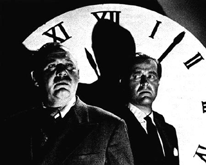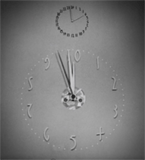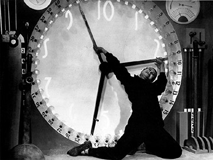Time is a substance constantly treated as a commodity in our society,
and indeed through Marx’s famous text Wage Labour and Capital, we have
one of the most powerful sources of evidence that time is itself arguably the
most important commodity of all. Yet if we accept that time is the most
valuable asset that each of us has to both offer and profit from in today’s
capitalist system, then it is surprising that the quality of it, is seldom
valued and re-valued in and of itself.
There must have been a time before time was structured and ordered in
its current format. This may seem an odd statement, but time passes whether or
not there is a clock to measure the progress of the day in rhythmic strokes. In
the history of humanity, the majority of our ancestors never had to bend to the
whim of the clock or to be leashed to mechanical methods of time measurement;
after all, its not the amount of hours we work that brings in the harvest, it’s
the amount of work we do, so therefore work has, for the majority of our
existence been measured primarily in action, and not just in time.
Of course there is an intrinsic connection between time and action, for
instance autumn is the season of harvest, and this being because the work of
mother nature operates in given stretches of time, but once again there is a
natural and unforced relationship between time and action; nature will fruit
according to its natural bonds with time, not with the artificial seconds
created in a bureaucrat’s office.

Throughout the centuries the accuracy of measuring time has been a hotly
pursued international contest, with the connection between exactness of second
and progress being heavily emphasised; for instance navigation required precise
measurements of time in order to determine a ship’s position on the world map.
Therefore large sums of money were set up as prize funds, to tempt the greatest
inventors of the age to solve navigational conundrums. These facts are pleasing
and interesting enough at first glance, but on further thought it is undeniable
that these ships were on their way to conquer and colonise the new world. The
development of the timepiece therefore, has, at this early stage, a direct
relationship with the aspirations of imperialism.
There may be some who think there is an innate connection between the
pursuit of knowledge and the advancement of the clock’s technological capacity,
but, if we go back to 1577, Jost Burgi’s invention of the cross-beat escapement
was designed in effect to measure time within the universe through astrology.
So time was only important in order to measure time. Essentially, the point is
that the worth of measuring time to the nth degree is very limited.
It is true to say that the advancement of time has been useful, in the
same way that capitalism has been useful, in creating the necessary productive
conditions in which socialism can take place. There is little doubt that the
finest divisions of time have helped the explosion of the innumerable sciences,
and at a deeper level, in reaching truths involving relativity and our own
place within the vastness of the universe.
However, it seems that whereas in previous centuries, time worked for
us, in present times and in modern times, we work for time. It is incredibly
important to redress the balance between man and time and to rectify the
question of who is the handmaiden to whom. Even in developed nations, where in
contrast to the rest of the world life expectancy is on the up, the quality of
this time is never evaluated, and it is never asked by the mainstream bourgeois
politicians and press: what is it worth, living to the ripe old age of eighty,
if every second is devoted to labour and the procurement of profit for the
slave-driver time, who is in turn under the whip of capital?
With falling pensions and higher retirement ages, the future looks bleak
in regards to the quality of time that we each spend on this earth. However,
under a socialist system, the possibility of fusing a greater quality of time
with a rising life expectancy is a realistic expectation.
People should be paid according to what they accomplish and not merely
in terms of the hours they work; if a system bred equality, the opportunity to
accomplish would also grow and not as the modern capitalists say through the
impetus of the smallest chance of profit. Under the current laws regarding pay
and time, the inequalities are intensified. For instance a lawyer can be paid
by the hour and extend his hours due to court wrangling and rise up the meter
of wealth due to fantastically overblown wages. Whereas an office worker could
work for 45 hours a week and still only have a measly pay packet at the end of
the month added to a decreasing job security. In fact it is almost certain,
that if his wages had not gone up, then their worth would have gone down due to
inflation. It should also stand to reason, that if you go in to your job, and
finish a quota or task early, then your working day should be over, and your
pay remain the same.
 It is proven, that due to the pressures of the clock, stress levels,
It is proven, that due to the pressures of the clock, stress levels,
mental illnesses and breakdowns are on the increase. The clock is more and more
being used to hound workers through their everyday lives, and the second hand’s
rapid rise and fall is being used as one of the most effective tools of
capitalism. The birth of the modern day clock may not have been to exercise the
will of capital, but as the seconds pass, it feels as if every waking moment is
being marshalled and regimented by time and not by its rightful master, us. The
precision of time is one more thing that falls under the category of state
apparatus. The only reason that time-keeping has to be so precise in the 21st
century, is so that exploitation has an exacting schedule that no-one can argue
with; so that the mindless transfer of asset from poor to rich can be achieved
not by the day, but by the second and the millisecond.
Strikes and Trade-Union activity are so important not only because they
demonstrate unity and clearness of vision and purpose, but they also represent
the taking of time into our own hands and the declaration that time is ours to
use and nothing else is true. We may have a definitive number of years on this
planet, and everyone is subject to physical health and physical decline, but
there is absolutely no reason why man and time cannot co-exist peacefully, so
that the quality of life in general can go up rather than stock market shares,
bank accounts and levels of blood pressure.






